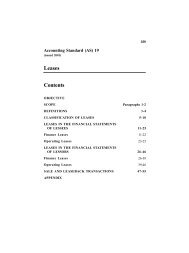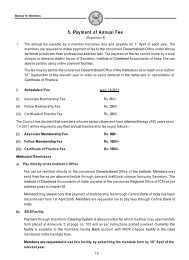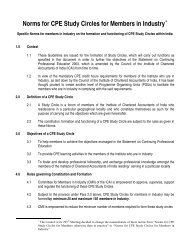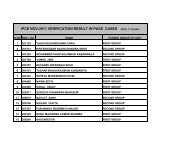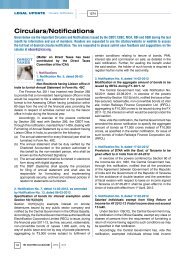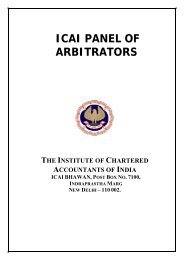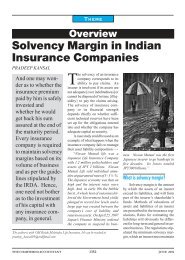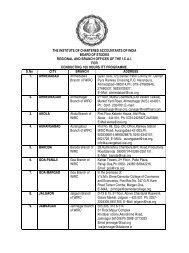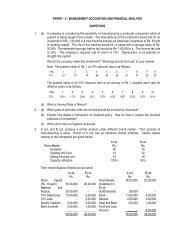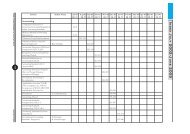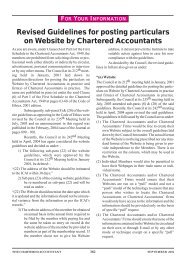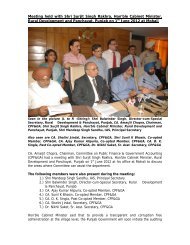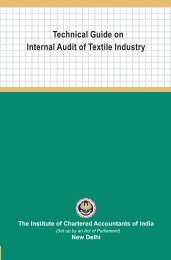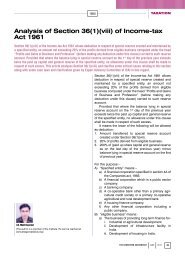The Chartered Accountant
The Chartered Accountant
The Chartered Accountant
Create successful ePaper yourself
Turn your PDF publications into a flip-book with our unique Google optimized e-Paper software.
profit and loss account and the balance-sheet<br />
complies with the Accounting Standards referred<br />
to in section 211(3C). Before introduction<br />
of sub-sections (3A), (3B) and (3C)<br />
in section 211 (with effect from October 31,<br />
1998), these Standards were not mandatory.<br />
<strong>The</strong>refore, the companies were then free to<br />
prepare their annual financial statements, as<br />
per the specific requirements of section 211<br />
read with Schedule VI. However, with the<br />
insertion of sub-sections (3A), (3B) and (3C)<br />
in section 211 the profit and loss account<br />
and the balance-sheet have to comply with<br />
the Accounting Standards. For this purpose<br />
the expression "Accounting Standards" shall<br />
mean the standards of accounting recommended<br />
by the Institute as may be prescribed<br />
by the Central Government in consultation<br />
with NAC on Accounting Standards. Thus,<br />
the Accounting Standards are prescribed by<br />
the Central Government. Thus, the Accounting<br />
Standards prescribed by the<br />
Central Government are now mandatory<br />
qua the companies and non-compliance<br />
with these Standards would lead to violation<br />
of section 211 inasmuch as the annual<br />
accounts may then not be regarded<br />
as showing a "true and fair view". (Paras14<br />
-17 on pages 219-222 of 297 ITR)<br />
DECEMBER 2008 966 THE CHARTERED ACCOUNTANT<br />
ACCOUNTING<br />
<strong>The</strong> judgement of Honourable Supreme Court in case of J.K. Industries<br />
(supra) is distinguishable since in that case Honourable Supreme Court was<br />
concerned with the matter of application of “Recognition & Measurement<br />
principles” provided by prescribed AS 22 and that they had held that the<br />
“Disclosure Principles” of Schedule VI are subservient to the overriding<br />
requirement of “True & Fair view”.<br />
<strong>The</strong> Honourable Supreme Court went on to discuss on<br />
the following question-<br />
“Whether the Central Government, which is<br />
the rulemaking authority, has overridden the<br />
Companies Act, 1956, either by exceeding<br />
its authority in adopting AS 22 or by making<br />
provisions inconsistent with sections<br />
209 and 211 read with Part I and Part II of<br />
Schedule VI to the Companies Act as alleged<br />
by the appellants.”<br />
<strong>The</strong> Honourable Supreme Court held that the impugned<br />
rule which adopts AS 22 neither suffers from<br />
the vice of excessive delegation nor is the said rule<br />
incongruous/inconsistent with the provisions of the<br />
Companies Act, 1956 for the following reasons:<br />
“In the present case, we are required to consider<br />
the scope of section 642(1), which refers<br />
to the power of the Central Government<br />
(rulemaking authority) to make rules vis-a-vis<br />
section 641, which states that subject to the<br />
provision of the section, the Central Government<br />
may, by notification in the Official<br />
Gazette, alter any of the regulations, rules,<br />
forms, tables and other provisions contained<br />
in any of the Schedules to the Companies<br />
Act (including Schedule VI). This aspect is<br />
of some importance. Section 642 is in addition<br />
to the powers conferred by section<br />
641, therefore, the two sections form part<br />
of the same scheme. However, the scope<br />
of section 641 is different from the scope<br />
of section 642. Power to alter any provision<br />
of the Schedules and the power to carry out<br />
gap filling exercise are both entrusted to the<br />
Central Government. <strong>The</strong> expression "in addition"<br />
to in section 642 indicates that both<br />
the above sections constitute one scheme.<br />
However, section 642 enables the Central<br />
Government to provide details and, therefore,<br />
under section 642 the rules contemplated<br />
refers to gap filling exercise.” (Para71<br />
on page 269 of 297 ITR)<br />
“<strong>The</strong>refore, power to make subordinate legislation<br />
is derived from the enabling Act and<br />
it is a fundamental principle of law which<br />
is self evident that the delegate on whom<br />
such power is conferred has to act within<br />
the limitations of the authority conferred<br />
by the Act. It is equally well settled<br />
that rules made on matters permitted by the<br />
Act in order to supplement the Act and not<br />
to supplant the Act, cannot be held to be<br />
in violation of the Act. A delegate cannot<br />
override the Act either by exceeding the<br />
authority or by making provisions inconsistent<br />
with the Act. (See Britnell v. Secretary<br />
of State for Social Security [1991] 2 All<br />
ER 726 (HL) at 730).” (Para72 on page 270<br />
of 297 ITR)



